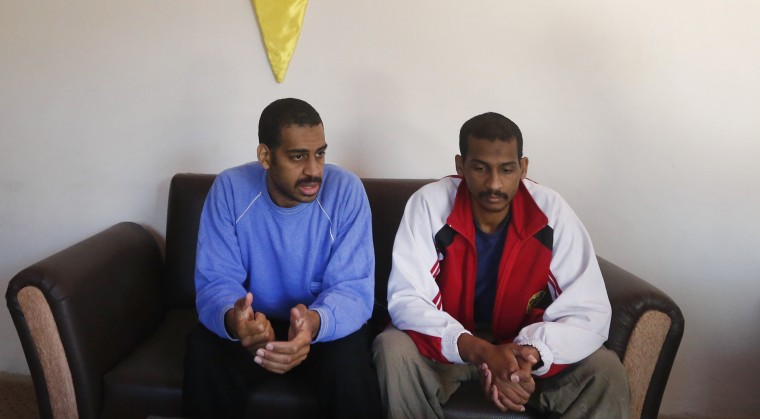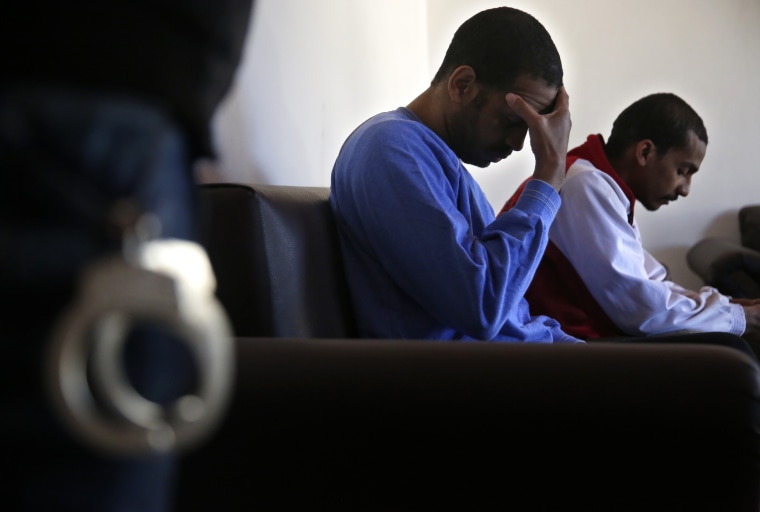LONDON — A British court has opened the way for two alleged members of the ISIS execution squad known as the Beatles to be prosecuted in the U.S. without seeking assurance the men would be immune from execution or transfer to Guantanamo if sent to the U.S.
A judgment in High Court Friday also revealed British officials did not seek those assurances from the U.S., even though Britain is an active international campaigner against the death penalty, because they were afraid of antagonizing President Donald Trump, former Attorney General Jeff Sessions, former Defense Secretary James Mattis and Secretary of State Mike Pompeo.
"At best they will think we have tin ears," argued the British ambassador to the U.S. in a document entered into evidence. "At worst, they will wind the President up to complain to the [prime minister] and, potentially, to hold a grudge."
El Shafee Elsheikh and Alexanda Kotey, who have been stripped of their British citizenship, are alleged to be two of the four ISIS members who beheaded Western hostages on camera. They are currently held by Kurdish fighters in Syria.
Among their victims were U.S. journalists James Foley and Steven Sotloff, and British aid workers David Haines and Alan Henning.

Britain wants the U.S. to prosecute the men, arguing there is "insufficient evidence" to do so in the U.K.
Details of Britain's efforts to secure prosecution in the U.S. without the possibility of execution or Guantanamo were revealed in legal documents describing meetings between U.S. and British officials.
In October 2015, during the Obama administration, Britain asked for an assurance that any evidence it provided to the U.S. would not be used to seek the death penalty against the suspects, who were not yet in custody. The U.S. agreed, but also said it could use the information to develop its own evidence.
Elsheikh and Kotey were captured by the Syrian Democratic Forces in January 2018.
The following month, FBI agents were given permission to visit Britain to review evidence against the men on an "information-sharing basis only."
When the then-Home Secretary, Amber Rudd, met Sessions in Washington in March 2018, according to evidence introduced in court, Sessions told her he believed foreign terrorist fighters should be prosecuted in their "home countries" but also referred to them as "prisoners of war" and said that Guantanamo Bay was the "appropriate place of detention for prisoners of war."
In addition to their anti-death penalty stance — the U.K. abolished the death penalty more than 50 years ago — British officials did not want suspects transferred to Guantanamo, because they believed it would contribute to jihadi recruitment.
Sessions' stance led Britain's Office for Security and Counter-Terrorism to advise that Rudd maintain the request for a "full death penalty assurance." Ben Wallace, the security minister, disagreed.
The Trump administration had made clear that if Britain wanted to obtain support for a U.S. prosecution, "it would be critical that evidence provided by the U.K. came with the least amount of restrictions possible," according to Graeme Biggar, the director of national security in the Home Office.
Biggar said Wallace was also informed that if the U.S. was left to deal with the individuals, "the outcome could not be predicted" and there were "strong voices arguing for Guantanamo."
The British fear of upsetting senior Trump administration officials, including the president, was revealed in documents describing a meeting between Sessions and British Home Secretary Sajid Javid in May 2018.
Sir Kim Darroch, the British ambassador to Washington, wrote Javid on May 15, 2018, that "parts of the U.S. machinery," notably career Justice Department officials "would not be surprised if we asked for death penalty assurances."
"It is what they expect of us," he added.
But the ambassador added, "That doesn't go for the senior political levels of this administration" and he named Jeff Sessions, Jim Mattis and Mike Pompeo — then the Attorney General, Secretary of Defense, and newly confirmed Secretary of State, respectively — and "senior political appointees in their departments."
"Their reaction is likely to be something close to outrage," Sir Kim warned. "They already feel that we are dumping on them a problem for which we should take responsibility.
"They have been signaling to us for weeks now that we are in no position to attach any conditions to this."
Sessions met Javid on May 30, 2018 and told him the U.S. should not be left to assume responsibility for "other nations' terrorist fighters," the documents said.
According to the documents, Sessions said that "if the U.S. were to be willing to try El Sheikh in a civilian court as opposed to a military one, he could not see how the U.S. could do that without the U.K. evidence or without recourse to the death penalty."
Five days later, Sessions told a Senate panel hearing, "I have been disappointed, frankly, that the British are not willing to try the cases but intend to tell us how to try them and they have certain evidence we need."
In the end, Javid told Boris Johnson, then the U.K. Foreign Secretary, "I acknowledge that in sharing evidence without any assurance at all, there is a serious risk that the individuals concerned, will if prosecuted and convicted, face execution as a direct result of U.K. assistance in this matter. "
But, he added, "In my view, this risk, and the related wider implications for the U.K.'s death penalty policy, are outweighed by the risks associated with no prosecution being brought in this case if U.K. evidence is not shared."
Johnson agreed, replying, "I am a strong advocate for abolishing the death penalty and the U.K.'s role in pursuing this globally. However, as with so much in relation to the fight against Daesh [ISIS], we find ourselves in an unprecedented and unique position."
Biggar said in a statement to the court, "It became clear to the Home Secretary during the course of that meeting that the position of the U.S. remained unchanged and that there was no prospect of the Attorney General offering any form of undertaking whatsoever.
"He assessed that, if he asked for assurances - whether full or partial — it was likely to prompt the sort of outrage he'd been advised of, and would damage the prospects of a U.S. criminal prosecution."
British police have now taken 600 statements regarding the suspects, some of which have already been shared with U.S. prosecutors.
On Friday, the High Court was ruling on an attempt by Elsheikh's mother to block the U.K. government from sharing information with the U.S., arguing that it might be used to impose the death penalty on her son.
Edward Fitzgerald, the attorney for Elsheikh's mother, had argued that helping the U.S. impose the death penalty would breach the "fundamental principles of justice and the rule of law, including international law."
The judges ruled that Britain was "keen to see Mr Elsheikh stand trial in a federal court in the U.S. and it was for that purpose that the assistance was provided.
"The U.K. was minimizing the risk of a transfer to Guantanamo, an outcome the Government wished to avoid."
The judges said the U.K. was "not in a position to demand any more."
In permitting the sharing of information, the judges ruled that the "anticipated emotional reaction of political appointees" was a consideration which the British Home Secretary was "entitled to take into account."
They added, "In conducting relations with foreign states, the government recognizes and responds to the realities of political life in the state concerned, whether or not it likes those realities. It would be very odd indeed to ignore them."
